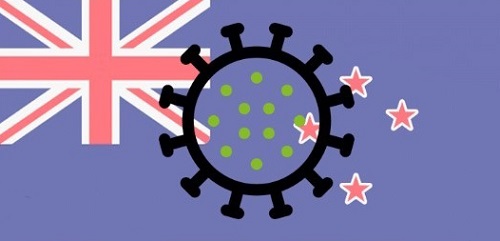COVID-19 News-New Zealand: Authorities Claim COVID-19 Cases Decreasing, Many Hospital Staff Infected, Doctors Report Shortage Of COVID-19 Antivirals!
Nikhil Prasad Fact checked by:Thailand Medical News Team Dec 18, 2023 1 year, 4 months, 7 hours, 32 minutes ago
COVID-19 News-New Zealand: In the latest update on the COVID-19 situation in New Zealand, authorities are cautiously optimistic as the nation reports a decrease in new cases over the past week. According to figures released by the Ministry of Health, there were 7,417 new cases reported, with 4,144 being reinfections.
https://www.tewhatuora.govt.nz/our-health-system/data-and-statistics/covid-19-data/covid-19-current-cases/

This decline in new cases provides a glimmer of hope amidst the ongoing challenges posed by the pandemic. However, the death toll remains at 27, emphasizing the gravity of the situation and the need for continued vigilance.
The seven-day rolling average of new cases stands at 1,058 per day, a decrease from the previous week's figure of 7,880 new cases. While this decrease is a positive sign, health experts caution that the situation remains fluid, and the upcoming holiday season could pose additional challenges.
Hospitals, in particular, are feeling the impact of the latest wave of COVID-19, with 354 individuals currently hospitalized and six in intensive care.
Doctors are however skeptical of the reported figures as they note that COVID-19 testing rates are low and many are coming to hospitals for conditions such as gastrointestinal issues, strokes and pneumonia which in reality are all SARS-CoV-2 induced but are not being classified as COVID-19 cases!
Wastewater trends indicate that community cases are still on the rise, adding pressure to an already strained healthcare system.
Growing Numbers Of Healthcare Staff Getting Infected
Contingency plans are being swiftly implemented in hospitals as the surge in COVID-19 cases affects staffing numbers.
Dr Fionnagh Dougan, director of hospital and specialist services at Te Whatu Ora, acknowledges the increase in sick staff within hospitals, including small clusters within specific teams or services.
https://www.rnz.co.nz/news/national/504508/hospital-contingency-plans-start-as-covid-wave-hits-staff
To address staffing challenges, hospitals are making use of additional resources where possible and tapping into the willingness of staff to alter their rostered days off at short notice. However, the Nurses' Organisation has raised concerns about the reliance on last-minute shift changes, citing potential issues related to fatigue and increased risks of mistakes. While Te Whatu Ora insists that it has systems in place to manage staffing levels throughout the year, the current situation highlights the broader issue of healthcare system staffing shortages during COVID-19 waves.
Shortage of COVID-19 Antivirals
As New Zealand battles this latest wave, it faces a new obstacle - a shortage of the antiviral drug Paxlovid. This medication has played a crucial role in keeping COVID-19 patients out of hospitals, and its scarcity is causing alarm among health authorities.<
br />
https://www.nzherald.co.nz/nz/stocks-of-paxlovid-antiviral-for-covid-19-run-dry-amid-new-zealands-virus-fifth-wave/75V3J6LNHNC3DIXYDAOPIQZW3Y/
In a joint statement to various
COVID-19 News-New Zealand outlets
, Pharmac and Te Whatu Ora acknowledge the limited stock of Paxlovid in some areas due to the spike in cases and heightened demand. Some pharmacies have temporarily run out of supplies, prompting a redistribution effort to ensure that eligible individuals can still access the drug.
Director of prevention at the national public health service, Becky Jenkins, and Pharmac's director of pharmaceuticals, Geraldine MacGibbon, expressed gratitude for those assisting in the redistribution of Paxlovid supplies. They assure the public that efforts are underway to secure additional courses of the drug, with almost 20,000 arriving on Thursday and being fast-tracked for distribution. Pharmac aims to obtain more Paxlovid for arrival in March and April of the following year.
The shortage of Paxlovid is particularly concerning given the timing of the fifth wave of the virus. Otago University public health professor Michael Baker underscores the significance of Paxlovid, noting its effectiveness in reducing symptoms, preventing hospitalizations, and decreasing mortality risk. He emphasizes the need to prioritize available supplies for elderly individuals and those with underlying health conditions who may be more vulnerable to severe outcomes.
New SARS-CoV-2 Variants Such As JN.1 Contributing To COVID-19 Crisis In New Zealand.
The unexpected intensity of the fifth wave, surpassing the previous wave in April, raises questions about the trajectory of the pandemic. Waning immunity over time and the swift evolution of the virus, leading to new, more infectious variants, pose significant hurdles. The unpredictability of the virus's behavior necessitates a consistent and adaptive strategy to manage the ongoing threat effectively.
Despite the challenges, health officials urge the public to prioritize COVID-19 booster shots, especially with the emergence of the newest variant, JN.1, in New Zealand. Modelling suggests that hospitalizations for the current wave will peak just days before Christmas, underscoring the importance of vaccination in mitigating the impact on the healthcare system.
As New Zealand confronts this complex and dynamic situation, health officials express gratitude for the flexibility and understanding of hospital staff. They assure the public that those in need of hospital-level care will receive it. However, the strain on the healthcare system underscores the urgency of ongoing efforts to manage and mitigate the impacts of the evolving COVID-19 pandemic in the country. The situation serves as a stark reminder of the need for resilience, adaptability, and a collective commitment to overcoming the challenges posed by the ongoing global health crisis.
For the latest
COVID-19 News-New Zealand, keep on logging to Thailand Medical News.
